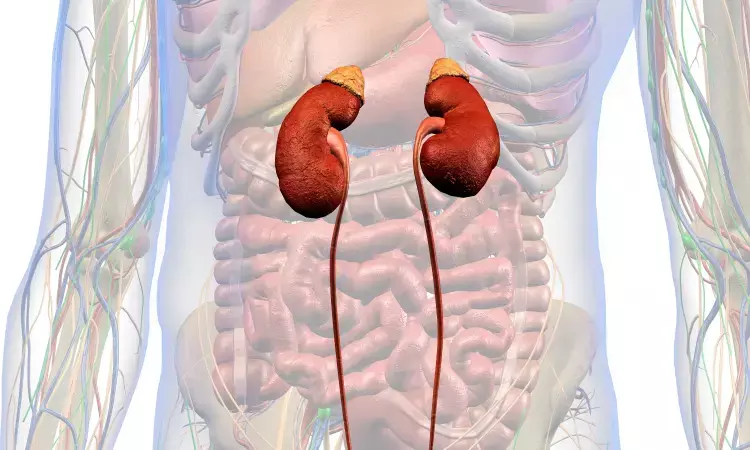- Home
- Medical news & Guidelines
- Anesthesiology
- Cardiology and CTVS
- Critical Care
- Dentistry
- Dermatology
- Diabetes and Endocrinology
- ENT
- Gastroenterology
- Medicine
- Nephrology
- Neurology
- Obstretics-Gynaecology
- Oncology
- Ophthalmology
- Orthopaedics
- Pediatrics-Neonatology
- Psychiatry
- Pulmonology
- Radiology
- Surgery
- Urology
- Laboratory Medicine
- Diet
- Nursing
- Paramedical
- Physiotherapy
- Health news
- Fact Check
- Bone Health Fact Check
- Brain Health Fact Check
- Cancer Related Fact Check
- Child Care Fact Check
- Dental and oral health fact check
- Diabetes and metabolic health fact check
- Diet and Nutrition Fact Check
- Eye and ENT Care Fact Check
- Fitness fact check
- Gut health fact check
- Heart health fact check
- Kidney health fact check
- Medical education fact check
- Men's health fact check
- Respiratory fact check
- Skin and hair care fact check
- Vaccine and Immunization fact check
- Women's health fact check
- AYUSH
- State News
- Andaman and Nicobar Islands
- Andhra Pradesh
- Arunachal Pradesh
- Assam
- Bihar
- Chandigarh
- Chattisgarh
- Dadra and Nagar Haveli
- Daman and Diu
- Delhi
- Goa
- Gujarat
- Haryana
- Himachal Pradesh
- Jammu & Kashmir
- Jharkhand
- Karnataka
- Kerala
- Ladakh
- Lakshadweep
- Madhya Pradesh
- Maharashtra
- Manipur
- Meghalaya
- Mizoram
- Nagaland
- Odisha
- Puducherry
- Punjab
- Rajasthan
- Sikkim
- Tamil Nadu
- Telangana
- Tripura
- Uttar Pradesh
- Uttrakhand
- West Bengal
- Medical Education
- Industry
Vitamin D deficiency does not impact outcomes in IgA nephropathy patients

India: A research paper published in BMC Nephrology has concluded that There is no association between vitamin D deficiency and disease profile and renal outcome in Indian patients with IgAN.
It is already known that a deficiency of Vitamin D is a risk factor associated with the severity and progression of kidney disease. This is because of its immunomodulatory effects.
More research data must be collected about its impact on IgA nephropathy (IgAN).
Considering this background, a study was done by Naba Farooqui and colleagues from the All India Institute of Medical Sciences, New Delhi, India.
Vitamin D level of < 10 ng/mL was defined as Vitamin D deficiency.
The study points include the following:
- 25 (OH) vitamin D assay was performed with serum samples collected during the kidney biopsy of 105 adult patients.
- These patients were diagnosed with primary IgAN between 2015 and 2019.
- 69.5 % of study participants were males, and the mean age of the patient was 34 ± 10.6 years.
- Vitamin D levels were 15.9 ± 11.9 ng/mL at baseline.
- Forty-one patients constituting 39 %, had vitamin D deficiency.
- Vitamin D deficient patients had a lower serum albumin level than those with a higher level of vitamin D (3.7 ± 0.9 vs 4.1 ± 0.7 g/dl). The differences in baseline proteinuria and eGFR were not significant.
- In the Vitamin D deficiency group, Crescentic lesions were more (19.5% vs 6.3%).
- There was no difference recorded in remission (68.3% vs 65.6%) and disease progression (12.5% vs 9.4%) )with and without Vitamin D deficiency of follow-up of 21.5 months.
- Vitamin D deficiency is not a significant risk factor for renal survival, having HR-1.79.
To conclude, vitamin D deficiency per se may not impact disease outcomes in IgAN patients.
Unnecessary treatment may lead to vitamin D intoxication.
Further reading:
Farooqui, N et al. Association of vitamin D status with disease severity and outcome in Indian patients with IgA nephropathy. BMC Nephrol 24, 15 (2023). https://doi.org/10.1186/s12882-023-03061-0
BDS, MDS in Periodontics and Implantology
Dr. Aditi Yadav is a BDS, MDS in Periodontics and Implantology. She has a clinical experience of 5 years as a laser dental surgeon. She also has a Diploma in clinical research and pharmacovigilance and is a Certified data scientist. She is currently working as a content developer in e-health services. Dr. Yadav has a keen interest in Medical Journalism and is actively involved in Medical Research writing.
Dr Kamal Kant Kohli-MBBS, DTCD- a chest specialist with more than 30 years of practice and a flair for writing clinical articles, Dr Kamal Kant Kohli joined Medical Dialogues as a Chief Editor of Medical News. Besides writing articles, as an editor, he proofreads and verifies all the medical content published on Medical Dialogues including those coming from journals, studies,medical conferences,guidelines etc. Email: drkohli@medicaldialogues.in. Contact no. 011-43720751


